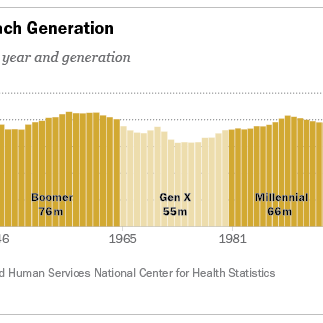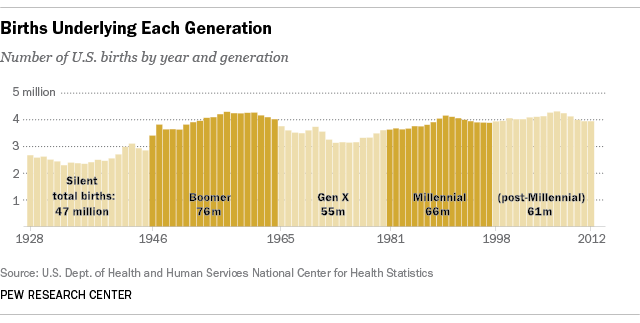
I’m lucky to share the stage with many bright thinkers and consultants who have interesting and compelling things to say about work, money, power and politics. One of my dearest friends is a middle-aged guy with a couple of kids who likes to talk about Millennials, for some reason.
(Seems creepy until I realize that his kids are Millennials. Then it makes sense. We talk about what we love.)
“Let’s face it. Work is changing. Millennials are here, and they aren’t going away. They don’t have an attention span. The youngest among them are borderline digital natives. They barely remember 9/11, and we need to rethink everything — from how we give feedback to how we structure the workday.”
There’s more. So much more. I have heard him speak so many times that I can recite his keynote by heart.
And my colleague is right to think about the changing workforce because Pew Research tells us that, this year, Millennials will overtake Baby Boomers. There are more young people than old people on the planet. Fax machines are a joke. And nobody picks up the phone, anymore.
That’s all fine, but I often remind my friend that more doesn’t mean better — nor is it a platform for change.
- We have more gun violence in America, and yet we cannot pass sensible gun reform or require better safety locks on weapons that are kept in millions of homes across America.
- We have more people than not with HPV in America — nearly 70% of US adults have the virus — but we cannot convince parents to vaccinate young girls and boys against the virus that causes cervical and throat cancer.
- We have more veterans killing themselves than died in combat, and yet we can’t address the prevailing problems of PTSD and mental health in our military.
More doesn’t mean anything other than more.
There are more Millennials than Baby Boomers in America? That’s great. I think “more” can and should prompt questions about efficacy and best practices. Times are changing, and as the world turns, it’s appropriate to question everything.
But when you manage by “more,” you run the risk of excluding the needs of the few. As an HR leader, it’s the smaller population of employees who may need you the most.
There are more men in CEO positions than females. There are more women carrying the burden of housework and full-time jobs than men. Minorities suffer more workplace injuries than majority employees. Aren’t we obligated to question the very construct of “more” to protect and guide the entire workforce?
So, as I tell my colleague, you can have a keynote speech where the audience wants to hear more about Millennials. I want to hear more about HR technology, workforce planning and diversity and inclusion programs that give each worker a fair shake at achieving the dream of creating great work and achieving financial independence.
This includes Millennials and Baby Boomers, but it also includes everybody else.

I have seen many speeches and read so much about millenials/demographics since I started working in HR these past 15 years. I have managed them along with baby boomers and Gen Xers and honestly I don’t see a big difference in how each generation works. I think it is more about how you react to your work life in your 20s, 30s, 40s and 50s and how you work to gain experience. Yes, they have never known life without technology, but so what? I don’t have an issue relating to them and I don’t think they have an issue relating to me. As long as you have good role definition and set expectations about their job and hire the right person for the job, I don’t think what generation you belong to really plays a big part in how you work as long as people respect each other and their differences. I think this whole generational thing is just an excuse for managers to blame the generation they hired instead of being a good manager and hiring the right person for the right job in the first place and coaching them along the way based on where they are in their life.
I still like the speeches though, because they are always entertaining. I would much rather listen to a speech about demographics than how to deal with Workers Comp, Unemployment Insurance or EEO:-)